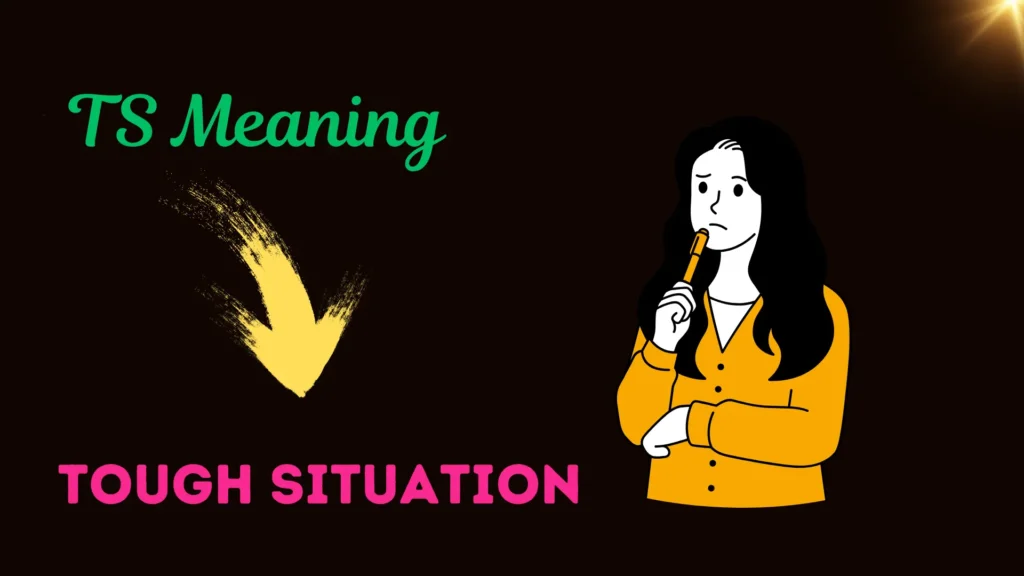Picture this: you’re mid-chat in a busy group text. Someone says something wildly off-topic, so you type “STFU.” 💬 Instant shock? Mixed vibes? That’s the power of four letters.
In this article, we’ll dive deep into the STFU meaning in text, how it’s used, when it’s rude or funny, and what you need to know before hitting send.
Let’s decode the slang that’s become a staple (and sometimes a hazard) in digital conversations.
What Does STFU Stand For?
STFU is an acronym for “Shut The F*** Up.” 🔇 It’s typically used in informal texting, online chats, social media comments, or direct messages.
Because it contains profanity, it’s considered rude or aggressive in many contexts. But like any slang, its meaning depends heavily on tone, relationship, and intent.
Origin & Context
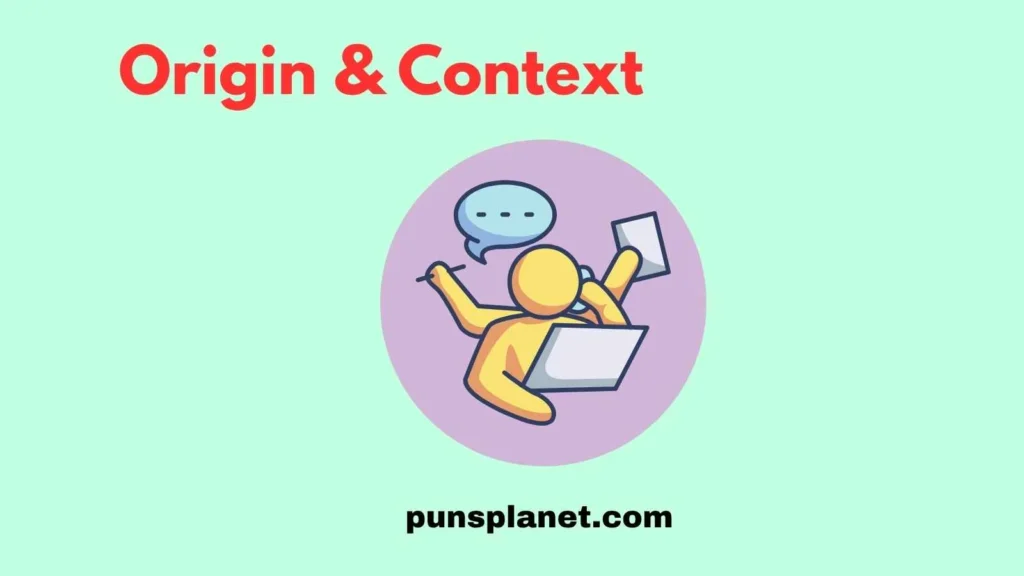
The exact origin is hard to trace, but STFU has been part of internet slang for over a decade. It grew alongside forums, online gaming, chat rooms, and social media platforms, where brevity and punchy responses reign.
Today, you’ll find it in memes, comment threads, or playful banter among friends—but also in heated arguments or trolling situations.
When & Why People Use STFU
Understanding why someone types “STFU” helps you gauge tone, response strategy, and appropriateness. Let’s break down a few scenarios.
| Scenario | Usage Context | Tone & Effect |
|---|---|---|
| Friendly Banter | A friend says something goofy or embarrassing | Playful, teasing—but only among people who know each other well |
| Argument or Road Rage | Someone overwhelms you with messages—frustration too high | Aggressive, dismissive, potentially hostile |
| Online Trolling | Used in social posts or replies to provoke attention | Confrontational, abrasive, intended to shut others down |
| Humor / Meme Culture | Memes with over-the-top reactions | Stylized and exaggerated, not meant to be taken literally |
As you can see, tone matters more than the words themselves. The same phrase can land as hilarious or hurtful depending on who says it and when.
Is STFU Rude or Acceptable?
- ✅ Acceptable among close friends who know your sense of humor.
- ⚠️ Risky in semi-formal or new relationships, like coworkers or acquaintances.
- ❌ Highly inappropriate in professional conversations, or with people who expect courtesy.
Here’s a quick guideline:
“STFU in a late-night meme chat with your bestie = funny. STFU in a performance review thread = disaster.”
Always think: Who is reading it? What’s your relationship? Could it be misinterpreted?
Examples of STFU in Different Conversations
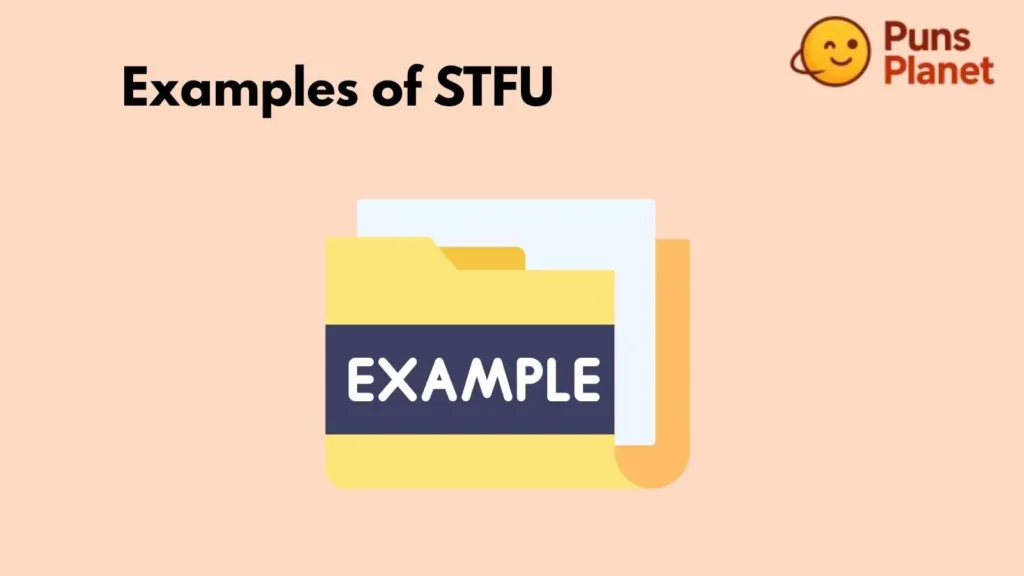
Example 1: Friendly Banter
You: “That video you just sent? I can’t stop laughing.”
Friend: “Haha shut the f*** up, you.” (typed as “STFU, you dork”) 😂
Example 2: Heated Argument
A: “You never listen to me.”
B: “STFU and stop talking until you calm down.” (cold, dismissive tone)
Example 3: Online Troll or Reply
Commenter A: “That post was pointless.”
Commenter B: “STFU and get your facts straight.” (hostile confrontation)
When You Shouldn’t Use STFU (and Alternatives)
There are times when “STFU” could do serious damage to your tone or reputation. Here’s when to avoid it—and what to say instead.
- Work or professional settings: Use polite requests like “Please stop” or “Can we take a break?”
- New or distant relationships: Opt for more courteous phrasing to avoid offense.
- Family members who dislike swearing: Avoid profanity altogether.
Alternatives to STFU
- “Please stop talking.”
- “Can we pause this conversation?”
- “I disagree—let’s cool down.”
- “Let’s take a breather.”
Psychological Impact & Emotional Tone
When someone says “STFU,” you’re not just hearing words. You’re reading emotion:
- Frustration: It signals anger or annoyance.
- Power dynamic: It’s a quick way to shut someone down.
- Humor or sarcasm: Depends on context—could mean “You’re too ridiculous.”
Using such direct language triggers one of two responses:
- Defensive reaction: The recipient might feel attacked.
- Playful bounce-back: Among close friends, it becomes part of inside jokes.
STFU & Internet Culture 🧠
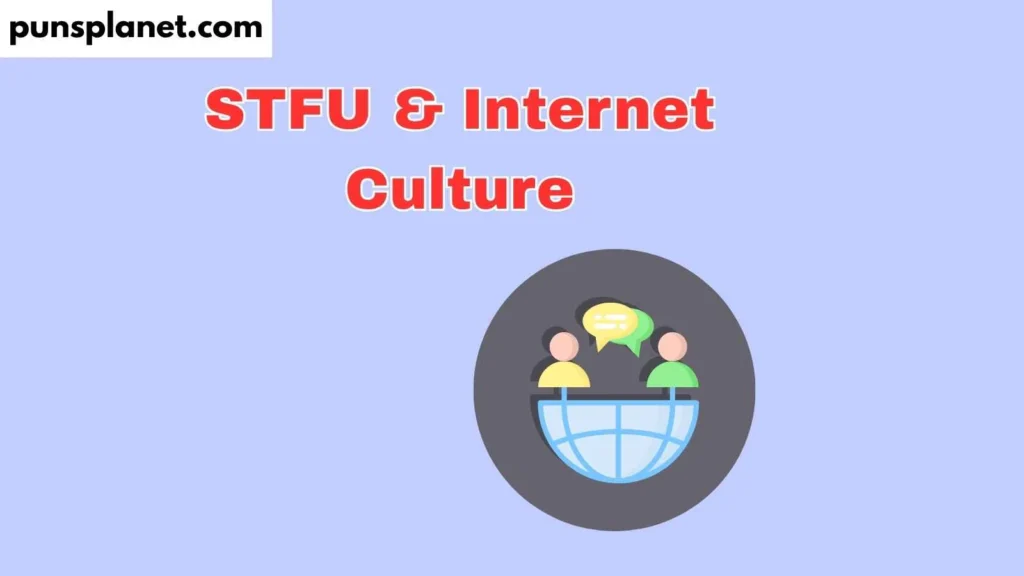
This acronym thrives in digital spaces. Let’s peek at its role in internet culture.
Usage in Memes & Social Media
Many memes show characters or captions shouting “STFU!” as a punchy response to absurdity. Because brevity rules, it often appears as text overlay or comment reaction.
Gaming & Online Community Chats
Gamers might type “STFU” mid-match when frustration kicks in—loud, fast, reactive. In that community, it’s sometimes tolerated (poor sportsmanship aside), especially when anonymity softens consequences.
How to Interpret Tone When You See STFU
When you read “STFU” in someone’s message, don’t assume the worst. Here are cues you can use to interpret tone and intent:
- Accompanying emojis: If there’s a 😂, 😜, or 😏, it’s probably joking.
- Caps or punctuation: “STFU!!!” may be more intense than “stfu.”
- Message length context: Short back-and-forth texts can feel more casual than long written paragraphs.
- Sender’s pattern: Do they often use slang like this? Or is it rare? That can help you read intent.
Quick Checklist to Decode STFU Tone
- Is the sender someone you trust?
- Is it a heated moment?
- Is there sarcasm or humor already in that conversation?
- Would you say “Hey, stop talking” in real life to them like that?
Legal & Cultural Considerations
While “STFU” isn’t illegal, using aggressive language can have consequences in certain cultural or organizational contexts:
- School or workplace policies: Bullying or harassment rules may catch phrases like this if considered harassment.
- Cultural sensitivity: Some languages or communities find direct profanity more offensive.
Global Variations
In different countries or among multilingual users, profanity varies. What’s playful slang in one culture may be deeply offensive in another. Always observe how people around you communicate.
How STFU Compares to Other Slang Terms
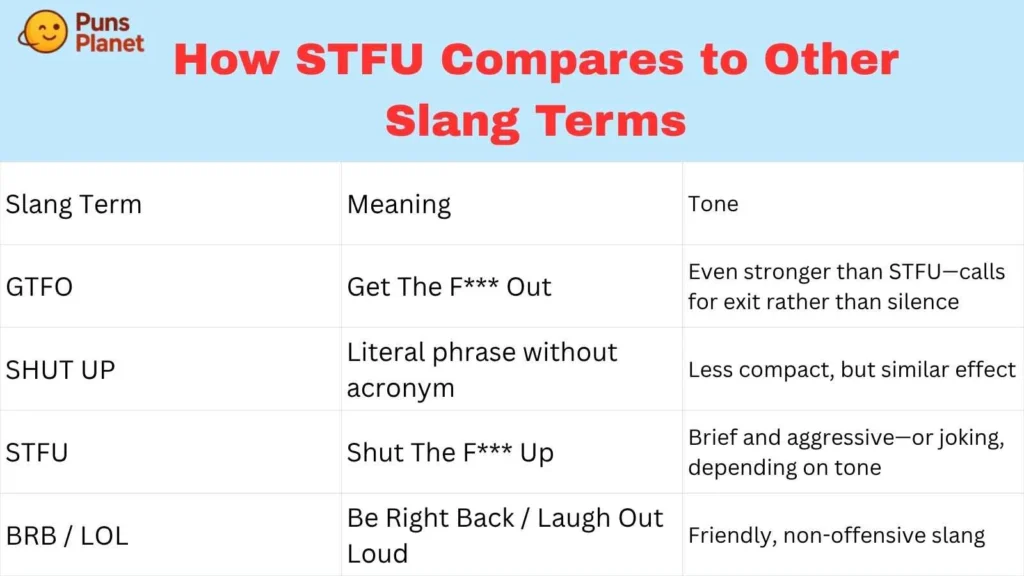
STFU is one among many text acronyms. Let’s compare it with others:
| Slang Term | Meaning | Tone |
|---|---|---|
| GTFO | Get The F*** Out | Even stronger than STFU—calls for exit rather than silence |
| SHUT UP | Literal phrase without acronym | Less compact, but similar effect |
| STFU | Shut The F*** Up | Brief and aggressive—or joking, depending on tone |
| BRB / LOL | Be Right Back / Laugh Out Loud | Friendly, non-offensive slang |
Protecting Trust & Authoritativeness in Real Conversations
As someone aiming for solid expertise, experience, authoritativeness, and trustworthiness (E-E-A-T), you should consider carefully whether to use or explain profanity in your writing:
- Label it clearly: “This content includes slang and profanity for illustration only.”
- Explain impact: Show how tone shifts based on relationship and medium.
- Offer alternative phrasing: Provide polite versions for readers who prefer milder communication.
FAQs:
1. Is it okay to say STFU to a friend?
Yes—if you both share a casual tone and understand each other’s humor. But use sparingly and never assume it’s always fine.
2. Can saying STFU damage relationships?
Absolutely. If misused—especially with someone sensitive or in a professional context—it can lead to misunderstandings, hurt feelings, or conflict.
3. How do you politely ask someone to stop talking without using STFU?
You can say things like “Please stop,” “Can we pause this conversation?”, or “Let’s revisit this later when we’re calmer.”
4. Does STFU ever have a non-negative meaning?
Yes. In memes, among close friends, or playful insults, “STFU” can carry humor rather than hostility.
5. Is STFU acceptable in workplace chats?
No. It’s considered unprofessional and could violate policies around respectful communication.
Conclusion:
Understanding what STFU meaning in text truly is goes far beyond four letters.
It’s about tone, timing, trust, and relationships.
Use it wisely—or not at all. And if you ever feel unsure: pause, reflect, and choose words that build connection instead of shut it down.

